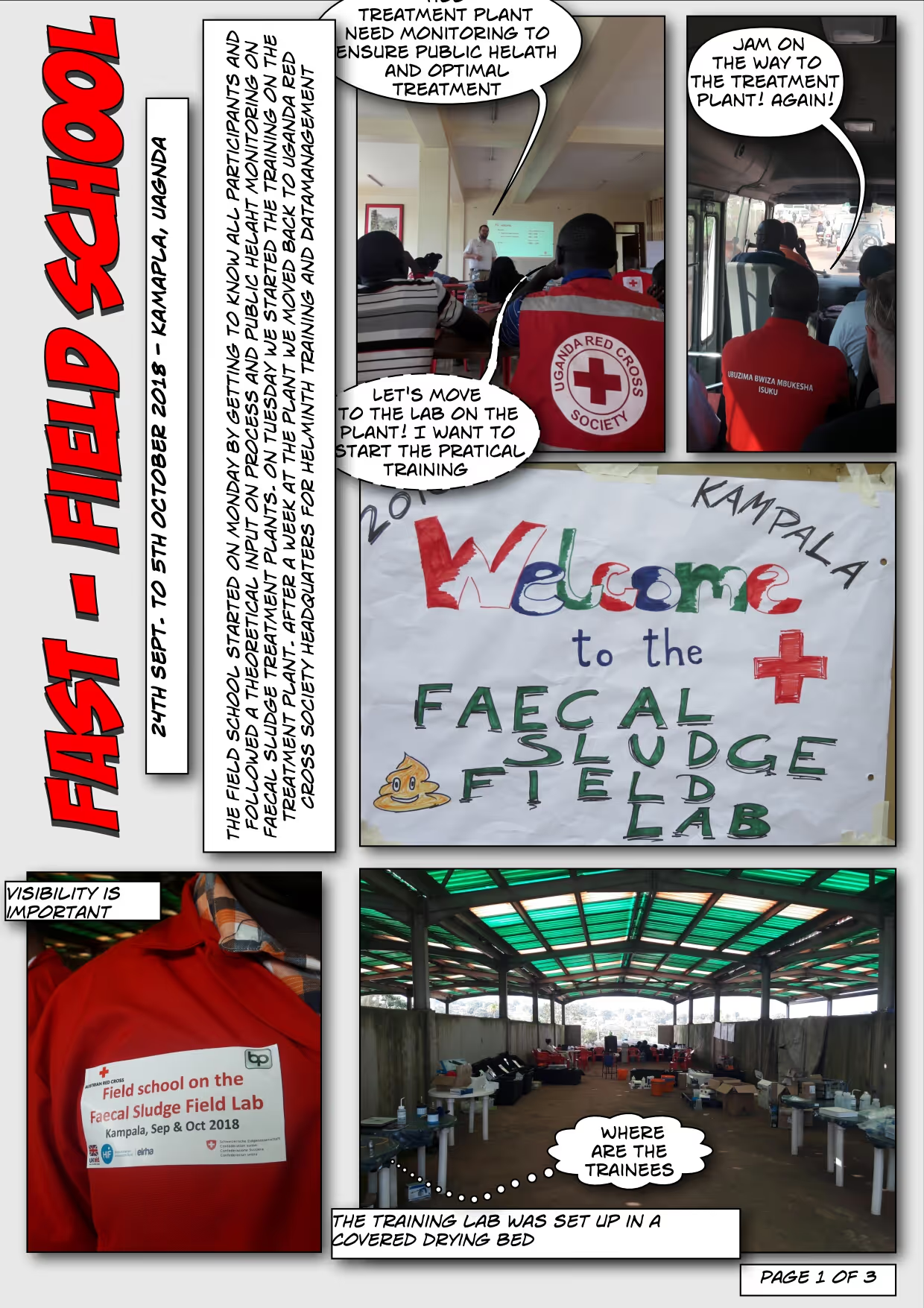What did the FAST project achieve and where are we now?

Our FAST project aimed to increase uptake of the Faecal Sludge Field Lab (FSFL) within the humanitarian aid and faecal sludge treatment community. The HIF funded diffusion project was carried out by a consortium between us, the Austrian Red Cross, and Butyl Products Ltd. In this blog entry we summarise what this project set out to do, what we achieved, and what the project has led to.
Key Achievements
- Attendance at conferences
- Development of training videos
- Field school in Sub Saharan Africa
We generated several opportunities to increase the reach of the project:
- Additional laboratory training for European Red Cross volunteers
- MDPI Water published a scientific paper on the development of the field lab: Development of a Field Laboratory for Monitoring of Fecal-Sludge Treatment Plants which HIF supported by funding the open access publication fee.
- Presentation of the FSFL at HIF and Department for International Development (DFID) events
- Presentations at the Emergency Environmental Health Forum and WEDEC conference - you can read more about these in this project blog.
Key Actions
1.Training materials and cooperation with the Medical Mission Institute:
For the development of training videos, the FSFL equipment was sent by Butyl Products to Austrian Red Cross in Vienna. This instigated a training for European Red Cross Water, Sanitation and Hygiene (WASH) volunteers with a strong laboratory background. As a result of this training, a technical cooperation began with the Medical Mission Institute in Würzburg regarding the development of training materials for the detection of Helminth eggs.
2. FSFL Field School in Uganda:
To identify a location for the FSFL field school we started a competition between the Sub Saharan Red Cross Societies. The Red Cross societies of the Ivory coast, Tanzania and Uganda applied to host the field school.
An independent advisory board chose the Ugandan Red Cross Society (URCS), with a faecal sludge and wastewater treatment plant in Kampala identified as the training location. During the two-week training 20 volunteers of the Ugandan, Rwandan, Kenyan, Ivory Coast, Tanzanian Red Cross Societies were trained to operate the lab.
A short summary of the training can be found in the comic report here: https://www.elrha.org/fast-field-school-comic/
3. Attracting additional funders for more training opportunities:
The development of the FSFL prototype during the Microbial Sludge Quality project funded by HIF, generated interest from Sandec, EAWAG (the Swiss Federal Institute of Aquatic Science and Technology) and the Swiss Development Cooperation (SDC).
Austrian Red Cross and EAWAG entered into a strategic cooperation for the continuous development and improvement of the FSFL. SDC funded the FSFL field school in Uganda, which in turn allowed a higher quality training for more participants. After the training, the lab was handed over to the URCS and is now used in development work, and kept for use in future humanitarian aid deployments.
As a direct outcome of the project and the cooperation with EAWAG, one FSFL was purchased by SDC and installed as training lab at the Spiez Laboratory for further training of SDC and Red Cross staff. The first training was held at the start of February alongside a stakeholder meeting with several humanitarian aid organisations.
Where are we now?
At the end of 2018, one FSFL was purchased by IFRC to be deployed as part of their response to the Rohingya refugee crisis in Cox’s Bazar.
The FSFL was set up at the beginning of 2019 to monitor two faecal sludge treatment plants set up and operated by the Red Cross and Red Crescent Movement within the mega camp next to the Myanmar border. The lab, staffed and managed by Red Cross lab technicians trained by FAST, is now monitoring several treatment plants.
The Austrian Red Cross together with EAWAG and IFRC are discussing installing another training FSFL at the Indonesian Red Cross training centre at Bandung. This would ensure the development of a lab technician pool in the area of the Red Cross Asian – Pacific Zone.
Currently we, EAWAG and SDC, have started on working incorporating the experience gathered in the first FSFL deployment to develop the FSFL version 2.0.
Photo Caption: Page from the FAST Ugandan Field School Comic. Credit: Austrian Red Cross.
Stay updated
Sign up for our newsletter to receive regular updates on resources, news, and insights like this. Don’t miss out on important information that can help you stay informed and engaged.
Explore Elrha
Learn more about our mission, the organisations we support, and the resources we provide to drive research and innovation in humanitarian response.


.png)